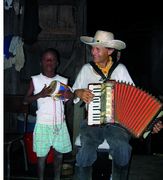Article published in the special Newsletter '15 years of PBI', October 2009
Flakito 1, volunteer from Great Britain (2002-4)
After volunteering with PBI, the musician Flakito travels 750 Km of the Santiago Way (Spain) to collect funds and raise awareness about the human rights situation in Colombia.
Walking is the most basic form of transport, it is not very quick but it has become my preferred means. In my first year as a volunteer with PBI I was in Barrancabermeja walking alongside brave members of NGOs such as the Grassroots Women’s Organisation (OFP) and the Regional Corporation for the Defence of Human Rights (CREDHOS). I accompanied them in their work and journeys around the Magdalena Medio region. Several times I walked as a witness alongside the mass marches of all the social organisations in Barrancabermeja. In my second year I was in Urabá, in more remote zones accompanying inspirational communities that are committed to non-violence and that do not want to be involved in the war. In Cacarica, during the dry season when there was insufficient water in the river for the canoes, we had to walk for hours in order to reach the isolated settlements. In San José de Apartadó where the road (which is only suitable for all terrain vehicles) ends, one had to walk or go up by mule or horse in order to reach the villages. I remember crossing endless mud in the mountains when we climbed up to the «Small Farmers’ University» in Arenas Altas on foot. This was a meeting of small farming communities resisting the war. They came from different regions of the country in order to share knowledge and experiences.
Before going to Colombia with PBI I earned my living through music, playing in a band or solo, and using the accordion to accompany my songs. I frequently used to travel in my van around the United Kingdom and Europe. I still continue with my music, but I no longer have the van. When I returned from Colombia I set the goal for myself of walking part of Spain. I decided to take the Camino de Santiago (Santiago Way), a route that has been followed by pilgrims for over one thousand years. It is complete with its own infrastructure of hostels for the walkers who come from all parts of the world. Previously, I had recorded a CD called «En Camino» with several musician friends, in order to sell it along the Camino and to donate the funds to PBI Colombia.
Amnesty International in Spain helped me with the costs for the hostels, providing me with a white sackcloth bearing the Amnesty logo and website address to cover my cart, as well as leaflets about their Colombian human rights campaign. I handed these leaflets out to the walkers that I met during my three months along the Camino, from April to June 2006. The local Amnesty groups in Pamplona, Logroño, Burgos, Palencia, León, Ponferrada and Santiago de Compostela organised concerts and talks in the municipal halls, colleges and universities, interviews with mayors, counsellors, the press, radio and television. We did this as a show of international solidarity to demonstrate what can be achieved with Amnesty International and PBI. Sometimes in other villages, when the owner of a hostel unexpectedly invited me to give a talk for their «pilgrims», I found myself performing a type of mental acrobatics trying to speak in Spanish, English and French, showing a DVD about San José de Apartadó for example and, of course, entertaining with some live songs.
I enjoyed those three months very much, although it was physically demanding owing to the distance (750km from the border with France) and the weight of my backpack. I carried my accordion, flute, percussion, amplifier and small microphones, Amnesty leaflets and CDs for sale to benefit PBI; all this in a small «all-terrain» two-wheel trolley. Several times members of the local Amnesty group accompanied and helped me for the day, meeting me as I entered or exited their city. On these occasions there was another very symbolic accompaniment, that of Pablo Arenales, a Colombian human rights defender residing in Spain and participating in Amnesty International’s asylum programme. I had accompanied Pablo many times during my first year with PBI in Colombia. Along the Camino through various cities we put together a complete presentation for interviews with the media. First of all I answered questions about the Camino and voluntary work with PBI in Colombia and the CD, and then Pablo spoke in more depth about the situation of human rights defenders in Colombia. Lastly, a representative of Amnesty International explained what could be done to support their campaign.
El Camino de Santiago is famous for being a sacred or magical path, depending on your beliefs. For me the experience does not depend on beliefs, but on the act of walking, of being immersed in nature and the human world, watching landscapes unfold as they draw closer and then are left behind. Mountains, forests, valleys, rivers, monuments, churches and cities. It is very different from what one feels from inside a train or a vehicle. And the opportunity for leisurely in-depth conversations with other walkers, whether it be about human rights, the achievements of civilisation and what we have lost through haste and pressure, or simply to share life experiences. The trust created between strangers is something sacred.
1 Artistic name of the author

